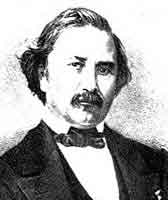
Joseph Louis François Bertrand (March 11, 1822 – April 5, 1900, born and died in Paris) was a French mathematician who worked in the fields of number theory, differential geometry, probability theory, economics and thermodynamics.
Bertrand was a professor at the École Polytechnique and Collège de France. He was a member of the Paris Academy of Sciences and was its permanent secretary for twenty-six years. He was the son of physician Alexandre Jacques François Bertrand and the brother of archaeologist Alexandre Bertrand. His father died when Joseph was only nine years old, but that did not stand in his way of learning and understanding algebraic and elementary geometric concepts, and he also could speak Latin fluently, all when he was of the same age of nine.
He conjectured, in 1845, that there is at least one prime between n and 2n − 2 for every n > 3. Chebyshev proved this conjecture, now called Bertrand's postulate, in 1850. He is also famous for a paradox in the field of probability, now known as Bertrand's Paradox. There is another paradox in game theory that is named for him, called the Bertrand Paradox.
Bertrand translated into French Carl Friedrich Gauss's work on the theory of errors and the method of least squares.
In the field of economics he reviewed the work on Oligopoly Theory, specifically Cournot competition model produced by the French mathematician and economist Augustin Cournot. The model of Bertrand competition argued that Cournot had reached a very misleading conclusion; reworking Cournot's duopoly model using prices rather than quantities as the strategic variables thus showing that the equilibrium price was simply the competitive price.
In 1858, he was elected a foreign member of the Royal Swedish Academy of Sciences.
Works by Bertrand
* Traité de calcul différentiel et de calcul intégral (Paris : Gauthier-Villars, 1864-1870) (2 volumes treatise on calculus)
* Rapport sur les progrès les plus récents de l'analyse mathématique (Paris: Imprimerie Impériale, 1867) (report on recent progress in mathematical analysis)
* Traité d'arithmétique (L. Hachette, 1849) (arithmetics)
* Thermodynamique (Paris : Gauthier-Villars, 1887)
* Méthode des moindres carrés (Mallet-Bachelier, 1855) (translation of Gauss's work on least squares)
* Leçons sur la théorie mathématique de l'électricité / professées au Collège de France (Paris : Gauthier-Villars et fils, 1890)
* Calcul des probabilités (Paris : Gauthier-Villars et fils, 1889)
* Arago et sa vie scientifique (Paris : J. Hetzel, 1865) (biography of Arago)
* Blaise Pascal (Paris : C. Lévy, 1891) (biography)
* Les fondateurs de l'astronomie moderne: Copernic, Tycho Brahé, Képler, Galilée, Newton (Paris: J. Hetzel, 1865) (biographies)
See also
* Bertrand's paradox (probability)
* Bertrand paradox (economics)
* Bertrand's box paradox
* Bertrand's theorem
* Bertrand's ballot theorem
Further reading
Struik, D.J. (1970–80). "Bertrand, Joseph Louis Francois". Dictionary of Scientific Biography. 2. New York: Charles Scribner's Sons. pp. 87-89. ISBN 0684101149.
External links
* Bertrand, Joseph Louis Francois (1822–1900)
* Joseph Louis François Bertrand
* References for Joseph Bertrand
* Works by Joseph Bertrand at Project Gutenberg
* Joseph Louis François Bertrand
Retrieved from "http://en.wikipedia.org/"
All text is available under the terms of the GNU Free Documentation License

